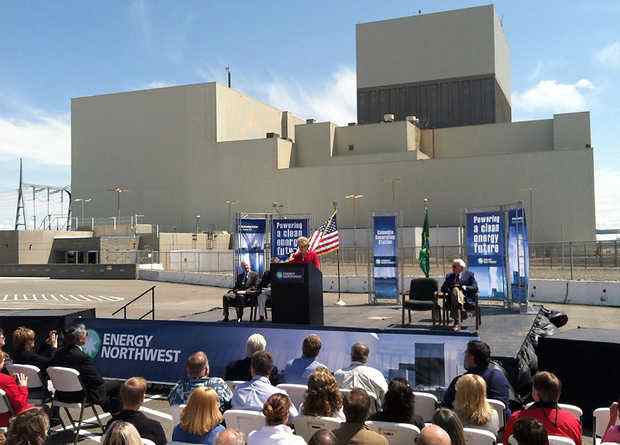forum
library
tutorial
contact

Columbia Generating Station
Deserved its Nuclear License Renewal
by Mark Reddemann
The Oregonian, June 25, 2012
|
the film forum library tutorial contact |

|
Columbia Generating Station
by Mark Reddemann
|
 2043.
2043.
It's not a year many people in the Northwest are thinking about, but it's one that we at Energy Northwest have focused on for the past five years.
Recently, we received news that bodes well for Washington's clean energy future: The Nuclear Regulatory Commission granted Columbia Generating Station a license renewal that permits the facility to operate through 2043. Columbia began its commercial operation in December 1984. Soon, we will celebrate 30 years of producing reliable, cost-effective, environmentally responsible electricity for Northwest ratepayers.
License renewal is not the rubber stamp that some critics claim it to be. Rather, it is a rigorous process that involves submitting a detailed application to the NRC for comprehensive review. The review includes numerous and independent on-site inspections and analysis of technical data. The public is also involved throughout the process, with multiple opportunities to express concerns related to the license renewal application.
Energy Northwest began its quest for license renewal in 2007 with a team of professionals who began compiling the information that would make up the application, which was submitted to the NRC in January 2010. That application included more than 2,200 pages. For the next 2 1/2 years, we worked with NRC staff to provide additional information and documentation to help with their evaluation of our safety procedures and potential environmental impacts.
Renewal of Columbia's operating license is key to meeting the region's current and future electricity needs. Columbia contributes nearly 10 percent of the power generated in Washington -- enough electricity to power 1 million homes. Energy Northwest provides all of the electricity produced by Columbia, at cost, to the Bonneville Power Administration, which delivers the power to utilities throughout Washington and other Western states.
Washington state enjoys an enviable status in the United States when it comes to its energy production -- an overwhelming majority of it is clean, or carbon-free. The state's noncarbon-emitting sources include a vast hydroelectric system, our now abundant wind turbines and, of course, Columbia.
But only two of these sources are considered baseload, or full-time: hydroelectric and nuclear. That type of 24/7/365 electricity is key for any economy or community that wants to sustain economic growth and opportunity. And because they are cost-effective sources of energy, we also enjoy one of the lowest electricity-rate structures in the U.S. It's hard to beat cheap and clean when you're talking about power.
That said, nuclear energy is also one of the safest industries in the United States. Our commitment to protect the public and our employees is unwavering and relentless. Even though we had already taken a number of actions following the events of 9/11 that make a Fukushima-type accident unlikely in the United States, we currently have a multidisciplined team that is incorporating the lessons learned from Japan's Fukushima disaster to make our facility and operations even safer.
When Washington Gov. Chris Gregoire visited Columbia recently, she complimented the men and women of Energy Northwest for the continued safe operation of the plant. Her acknowledgement of our commitment to safety as our No. 1 priority meant a lot. As we finish out the remaining years of our initial license and enter into our next 20 years of operation, I pledge to our neighbors throughout the Northwest to maintain that commitment.
learn more on topics covered in the film
see the video
read the script
learn the songs
discussion forum
